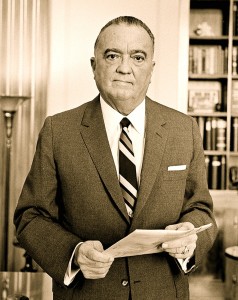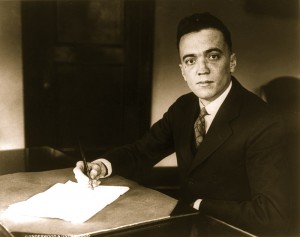J. Edgar Hoover
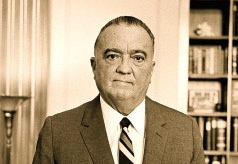
J Edgar Hoover : Documentary on J Edgar Hoover Head of the FBI
J. Edgar Hoover : Documentary on J Edgar Hoover Head of the FBI J Edgar Hoover : Documentary on J Edgar Hoover Head of the FBI . 2013 2014 This documentary as well as all of the rest of these documentaries shown here are. A vivid and no-holds-barred look J. Edgar Hoover’s deepest secrets. Did J. Edgar Hoover Really Wear Dresses? Welcome to the bizarre world of J. Edgar Hoover. J Edgar Hoover : Documentary on J Edgar Hoover – Head of the FBI . 2013 This documentary and the rest of the documentaries presented relate to important time. On Friday, November 29, 1963, exactly one week after President John F. Kennedy had been killed by a sniper’s bullets in Dallas, Texas, new U.S. President Lyn.
John Edgar Hoover (January 1, 1895 – May 2, 1972) was the first Director of the Federal Bureau of Investigation (FBI) of the United States, appointed director of the Bureau of Investigation—predecessor to the FBI—in 1924. He was instrumental in founding the FBI in 1935, where he remained director until his death in 1972 at the age of 77. Hoover is credited with building the FBI into a larger crime-fighting agency, and with instituting a number of modernizations to police technology, such as a centralized fingerprint file and forensic laboratories.
Late in life and after his death, Hoover became a controversial figure as evidence of his secretive abuses of power began to surface. He was found to have exceeded the jurisdiction of the FBI and to have used the FBI to harass political dissenters and activists, to amass secret files on political leaders, and to collect evidence using illegal methods. Hoover consequently amassed a great deal of power and was in a position to intimidate and threaten sitting presidents. According to biographer Kenneth Ackerman, the notion that Hoover’s secret files kept presidents from firing him is a myth. However, Richard Nixon was recorded as stating in 1971 that one of the reasons why he did not fire Hoover was that he was afraid of reprisals against him from Hoover.
According to President Harry S. Truman, Hoover transformed the FBI into his private secret police force. Truman stated that “we want no Gestapo or secret police. The FBI is tending in that direction. They are dabbling in sex-life scandals and plain blackmail. J. Edgar Hoover would give his right eye to take over, and all congressmen and senators are afraid of him.”
Early life and Education
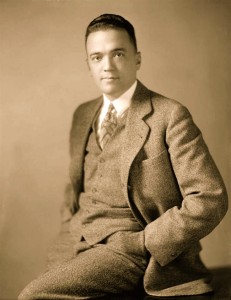 J. Edgar Hoover was born on New Year’s Day 1895 in Washington, D.C., to Anna Marie (née Scheitlin; 1860–1938), who was of German Swiss descent, and Dickerson Naylor Hoover, Sr. (1856–1921), of English and German ancestry. The uncle of Hoover’s mother was a Swiss honorary consul general to the United States. Hoover did not have a birth certificate filed, although it was required in 1895 Washington. Two siblings had certificates. Hoover’s was not filed until 1938, when he was 43.
J. Edgar Hoover was born on New Year’s Day 1895 in Washington, D.C., to Anna Marie (née Scheitlin; 1860–1938), who was of German Swiss descent, and Dickerson Naylor Hoover, Sr. (1856–1921), of English and German ancestry. The uncle of Hoover’s mother was a Swiss honorary consul general to the United States. Hoover did not have a birth certificate filed, although it was required in 1895 Washington. Two siblings had certificates. Hoover’s was not filed until 1938, when he was 43.
Various sources assert that Hoover also had some African American ancestry. Author Gore Vidal grew up in Washington, D.C. in the 1930’s and said in an interview: “It was always said in my family and around the city that Hoover was mulatto. And that he came from a family that passed.” Author Anthony Summers wrote in his 1993 book Official and Confidential, The Secret Life of J. Edgar Hoover that, in some black communities in the eastern United States, it was generally believed that Hoover had black roots.
Hoover grew up near the Eastern Market in Washington’s Capitol Hill neighborhood. At Central High, he sang in the school choir, participated in the Reserve Officers’ Training Corps program, and competed on the debate team,[10] where he argued against women getting the right to vote and against the abolition of the death penalty. The school newspaper applauded his “cool, relentless logic.”
Hoover was a stutterer as a boy, which he overcame by teaching himself to talk fast—a style that he carried through his adult career. He eventually spoke with such ferocious speed that stenographers had a hard time following him.
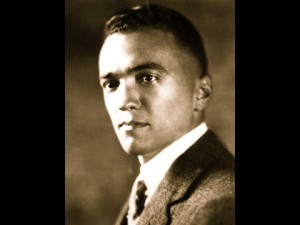 He obtained a Bachelor of Laws from The George Washington University Law School in 1916, where he was a member of the Alpha Nu Chapter of the Kappa Alpha Order and an LL.M., and a Master of Laws degree in 1917 from the same university. While a law student, Hoover became interested in the career of Anthony Comstock, the New York City United States Postal Inspector, who waged prolonged campaigns against fraud and vice, and also against pornography and birth control. Hoover lived in Washington, D.C. for his entire life.
He obtained a Bachelor of Laws from The George Washington University Law School in 1916, where he was a member of the Alpha Nu Chapter of the Kappa Alpha Order and an LL.M., and a Master of Laws degree in 1917 from the same university. While a law student, Hoover became interested in the career of Anthony Comstock, the New York City United States Postal Inspector, who waged prolonged campaigns against fraud and vice, and also against pornography and birth control. Hoover lived in Washington, D.C. for his entire life.
Hoover was 18 years old when he accepted his first job, an entry-level position as messenger in the orders department at the Library of Congress. The library was a half mile from his house. The experience shaped both Hoover and the creation of the FBI profiles; as Hoover noted in a 1951 letter, “This job …trained me in the value of collating material. It gave me an excellent foundation for my work in the FBI where it has been necessary to collate information and evidence.”
Department of Justice
Immediately after getting his LL.M degree, Hoover was hired by the Justice Department to work in the War Emergency Division. He soon became the head of the Division’s Alien Enemy Bureau, authorized by President Wilson at the beginning of World War I to arrest and jail disloyal foreigners without trial. He received additional authority from the 1917 Espionage Act. Out of a list of 1,400 suspicious Germans living in the U.S., the Bureau arrested 98 and designated 1,172 as arrestable.
In August 1919, Hoover became head of the Bureau of Investigation’s new General Intelligence Division—also known as the Radical Division because its goal was to monitor and disrupt the work of domestic radicals. America’s First Red Scare was beginning, and one of Hoover’s first assignments was to carry out the Palmer Raids.
Hoover and his chosen assistant George Ruch monitored a variety of U.S. radicals with the intent to punish, arrest, or deport them. Targets during this period included Marcus Garvey; Rose Pastor Stokes and Cyril Briggs; Emma Goldman and Alexander Berkman; and future Supreme Court justice Felix Frankfurter who, Hoover maintained, was “the most dangerous man in the United States.”
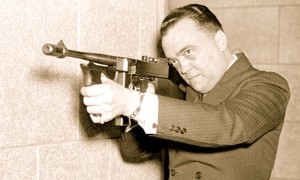 In 1921, he rose in the Bureau of Investigation to deputy head and, in 1924, the Attorney General made him the acting director. On May 10, 1924, President Calvin Coolidge appointed Hoover as the sixth Director of the Bureau of Investigation, partly in response to allegations that the prior director, William J. Burns, was involved in the Teapot Dome scandal. When Hoover took over the Bureau of Investigation, it had approximately 650 employees, including 441 Special Agents.
In 1921, he rose in the Bureau of Investigation to deputy head and, in 1924, the Attorney General made him the acting director. On May 10, 1924, President Calvin Coolidge appointed Hoover as the sixth Director of the Bureau of Investigation, partly in response to allegations that the prior director, William J. Burns, was involved in the Teapot Dome scandal. When Hoover took over the Bureau of Investigation, it had approximately 650 employees, including 441 Special Agents.
Hoover was sometimes unpredictable in his leadership. He frequently fired FBI agents, singling out those that he thought “looked stupid like truck drivers,” or that he considered “pinheads.” He also relocated agents who had displeased him to career-ending assignments and locations, Melvin Purvis being the prime example. Purvis was one of the most effective agents in capturing and breaking up 1930’s gangs, and it is alleged that Hoover maneuvered him out of the FBI because Hoover was jealous of the substantial public recognition that Purvis received.
Hoover often hailed local law-enforcement officers around the country and built up a national network of supporters and admirers in the process. One that he often commended was the conservative sheriff of Caddo Parish, Louisiana, J. Howell Flournoy, for particular effectiveness.
Gangster Wars
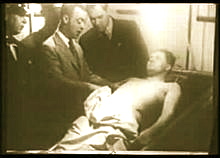 Famous Depression Era gangsters, including Pretty Boy Floyd, Baby Face Nelson, Machine Gun Kelly, and more (1920’s).
Famous Depression Era gangsters, including Pretty Boy Floyd, Baby Face Nelson, Machine Gun Kelly, and more (1920’s).
In the early 1930’s, criminal gangs carried out large numbers of bank robberies in the Midwest. They used their superior firepower and fast getaway cars to elude local law enforcement agencies and avoid arrest. Many of these criminals frequently made newspaper headlines across the United States, particularly John Dillinger, who became famous for leaping over bank cages and repeatedly escaping from jails and police traps. The gangsters enjoyed a level of sympathy in the Midwest, as banks and bankers were widely seen as oppressors of common people during the Great Depression.
The robbers operated across state lines, and Hoover pressed to have their crimes recognized as federal offenses so that he and his men would have the authority to pursue them and the credit for capturing them. Initially, the FBI suffered some embarrassing foul-ups, in particular with Dillinger and his conspirators. A raid on a summer lodge named “Little Bohemia” in Manitowish Waters, Wisconsin left an FBI agent and a civilian bystander dead and others wounded. All the gangsters escaped. Hoover realized that his job was now on the line, and he pulled out all stops to capture the culprits. In late July 1934, Special Agent Melvin Purvis, the Director of Operations in the Chicago office, received a tip on Dillinger’s whereabouts that paid off when Dillinger was located, ambushed, and killed by FBI agents outside the Biograph Theater.
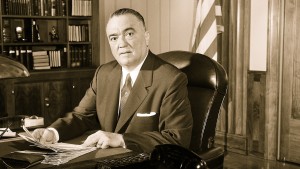 In the same period, there were numerous Mafia shootings as a result of Prohibition, while Hoover continued to deny the very existence of organized crime. Gangster Frank Costello helped encourage this view by feeding Hoover tips on sure winners through their mutual friend, gossip columnist Walter Winchell. (Hoover had a reputation as “an inveterate horseplayer” known to send Special Agents to place $100 bets for him. Hoover said that the Bureau had “much more important functions” than arresting bookmakers and gamblers.
In the same period, there were numerous Mafia shootings as a result of Prohibition, while Hoover continued to deny the very existence of organized crime. Gangster Frank Costello helped encourage this view by feeding Hoover tips on sure winners through their mutual friend, gossip columnist Walter Winchell. (Hoover had a reputation as “an inveterate horseplayer” known to send Special Agents to place $100 bets for him. Hoover said that the Bureau had “much more important functions” than arresting bookmakers and gamblers.
Hoover was credited with several highly publicized captures or shootings of outlaws and bank robbers, even though he was not present at the events. These included that of Dillinger, Alvin Karpis, and Machine Gun Kelly, which led to the Bureau’s powers being broadened and it was given its new name in 1935: the Federal Bureau of Investigation. In 1939, the FBI became pre-eminent in the field of domestic intelligence. Hoover made changes, such as expanding and combining fingerprint files in the Identification Division, to compile the largest collection of fingerprints to date. Hoover also helped to expand the FBI’s recruitment and create the FBI Laboratory, a division established in 1932 to examine and analyze evidence found by the FBI.

